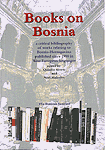
|
 |
 |
Selected Longer Reviews
With Their Backs to the World: portraits from Serbia
|
By Seierstad, Asne
|
Virago Press,
2005,
340 pages,
Shelf mark: 949.71
|
Portraits from Serbia
by Brendan Simms
With their backs to the world. Portraits from Serbia
by Asne Seierstad, translated by Sindre Kartvedt
Some years ago a distinguished American was challenged to reflect on the large number of countries the United States had bombed since 1945. ‘All to their immense benefit’, he replied evenly. I was reminded of this exchange when reading Asne Seierstad’s latest book. After the success of her debut The Bookseller of Kabul, and her less acclaimed but still well-regarded account of the Iraq war and its aftermath, Seierstad has now turned her attention to explaining contemporary Serbs, the people ‘with their backs to the world’. The story is made up of fourteen vignettes, based on in-depth interviews and encounters with a cross-section of the population: villagers, politicians, house-wives, priests, artists, and journalists.
It is a book of great compassion and frequent comedy. There are the wizened and baffled peasants who believe that ‘Serbia is not ready for democracy’: the author dubs them ‘hunchbacks for Milosevic’. Then there is the black-market trader Michel, foul-mouthed in at least four languages, who veers between the criminal and entrepreneurial; Seierstad’s description of a demented restaurant conversation is both compelling and excruciating. My favourite is the slightly foppish Serbian Orthodox deacon Sveta, who argues that ‘As a young priest my job is to convert young people, and I should look youthful and hip. You know, Jesus is forever young’. After a diatribe against the soulless west – particularly the United States – he loudly refuses alcohol on Good Friday. When everyone else accepts, he relents: ‘All right then’.
Seierstad has been praised for her humane and ‘non-judgmental’ approach. In one sense this is true: her subjects, even the manifestly flawed among them, are never caricatured. But there is no sense of relativism or detachment: there is a strong moral and even political spine to the author. Her questioning is unrelenting without being hectoring. She interviews the wife of the notorious camp guard Dusan Tadic, and memorably captures her blend of forced dignity and denial. Asked why her jailed husband and she do not correspond, Mrs Tadic rounds on the author, and for a moment the tables are turned: ‘Is this where you want me to say that I read his letters five times a day, and that my tears fall on them and dissolve the words? That I’ve read them to pieces? Would that work for your book?’, she asks.. Faced with a barrage of paranoia, obfuscation and self-pity, Seierstad repeatedly reminds her interlocutors of the massacre of Bosnian Muslims at Srebrenica and the expulsion of the Kosovar Albanians. She never allows the reader to come away with the impression that the NATO bombing of Yugoslavia was anything other the logical consequence of a decade of nationalist hysteria, ethnic cleansing and aggression.
The book, which opens with empathetic and often light-hearted sketches of everyday life slowly works its way towards the head of the snake: the legacy of torture, expulsion and mass murder with which Milosevic’s Serbia became synonymous in the eyes of the world. It is perhaps no accident that the final chapter takes us from Belgrade to Bosnia, the principal victim of the Greater Serb project, to which so many – but by no means all - of Seierstad’s subjects subscribed. And it was only the intervention of NATO which ultimately brought that horror to an end, and paved the way for the removal of the man who had blighted the lives of ordinary Serbs for so long: Slobodan Milosevic. The most clear-sighted character in the book, Milos from Kragujevac, whose decrepit factory was flattened by American jets, comments: ‘They shouldn’t have stopped with the car plant – they should have bombed Milosevic’s house, his wife and his corrupt kids’. Milos certainly believed that the NATO campaign against Yugoslavia in 1999, which cost so many innocent lives, had been to his immense benefit in the long run.
This review appeared in The Sunday Times (London), 13 November 2005
Back to Books on Bosnia

|
|
 |

Books on
Bosnia:A database of 379 book reviews and 3741 books held by the Institute:
|
|